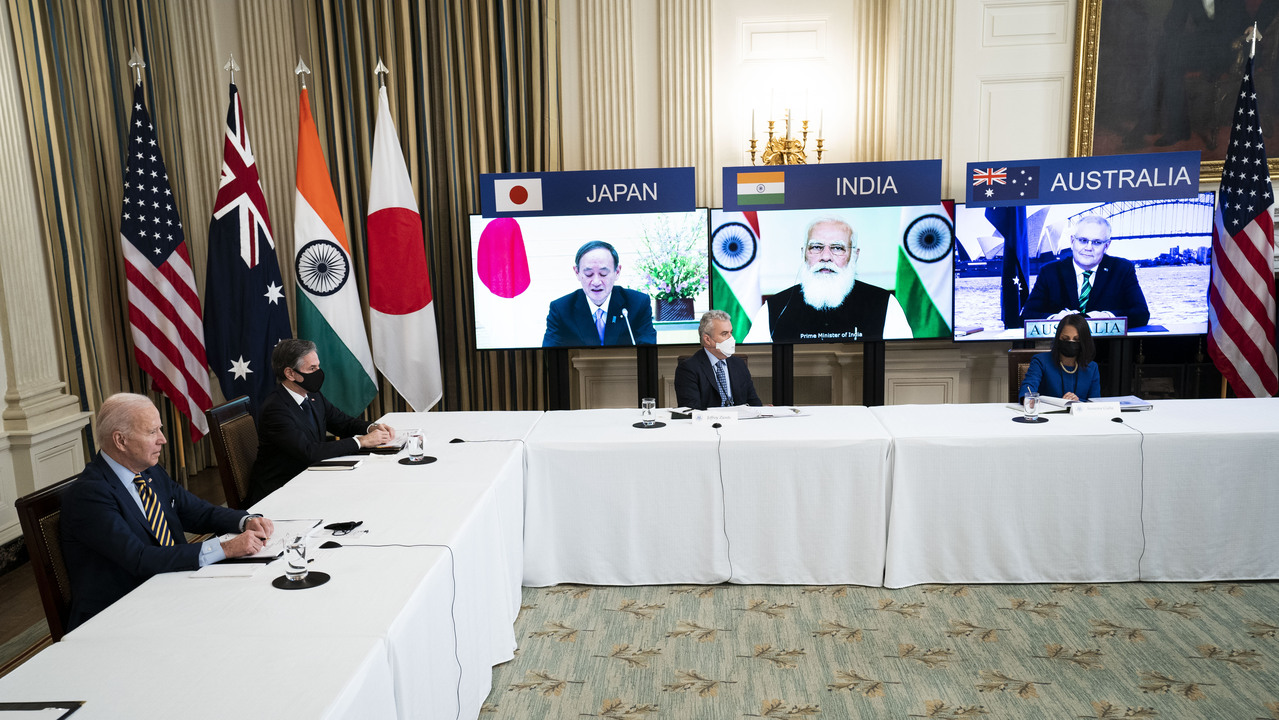Quad summit signals the US is not taking its eye off the Indo-Pacific
Sign up now: Get ST's newsletters delivered to your inbox

A file photo of President Joe Biden meeting virtually with Prime Minister Narendra Modi of India, as well the leaders of Japan and Australia, on March 12, 2021.
PHOTO: NYTIMES
WASHINGTON - The United States remains focused on the Indo-Pacific despite the crisis in Europe, a senior official in the White House National Security Council (NSC) said on Thursday (March 3).
Mr Edgard D. Kagan, the NSC's senior director for East Asia and Oceania, was speaking shortly after a virtual meeting of leaders of the Quad - India, Japan, Australia and the United States.
US officials pointed to regular high-level visits to the Indo-Pacific, from Seoul to Singapore and Fiji, as well as the continuing US Navy presence in the region such as the Japan-based guided missile destroyer USS John McCain sailing through the Taiwan Strait last month, the first time for such a passage during the current Biden administration.
The commitment to a free and open Indo-Pacific continues to be emphasised, most recently at Thursday's Quad meeting.
Prime ministers Scott Morrison of Australia, Narendra Modi of India, and Fumio Kishida of Japan, and US President Joe Biden "convened to reaffirm their commitment to a free and open Indo-Pacific, in which the sovereignty and territorial integrity of all states is respected and countries are free from military, economic and political coercion" the joint readout from the White House said.
"The Quad leaders discussed the ongoing conflict and humanitarian crisis in Ukraine and assessed its broader implications," the statement said.
"They agreed to stand up a new humanitarian assistance and disaster relief mechanism which will enable the Quad to meet future humanitarian challenges in the Indo-Pacific and provide a channel for communication as they each address and respond to the crisis in Ukraine."
Quad leaders have agreed to meet in person in Tokyo in the coming months, the statement added.
In Japan, Mr Kishida told reporters: "We agreed that we should not allow any unilateral change to the status quo by force in the Indo-Pacific region like the latest case (in Ukraine) and we need to step up efforts to promote a free and open Indo-Pacific in times like this."
On Feb 11, the US released a 12-page Indo-Pacific Strategy document even as fears were growing then of an imminent Russian invasion of Ukraine.
It came as US Secretary of State Antony Blinken was visiting Fiji, the first such US official to visit the island nation in 36 years. While on the island, Mr Blinken said: "We see our long-term future in the Indo-Pacific, it's as simple and basic as that."
Critics said the document was short on specifics in terms of economic strategy, an issue Mr Kagan addressed during a Hudson Institute panel discussion on Thursday.
He said: "There is very much a view that in Asia, and in the Indo-Pacific, that trade equals strategy and strategy equals trade. I think that you need to have an economic approach if you want to have a successful strategy. We recognise that. We are working on it."
Mr Kagan, who travelled to Singapore and Vietnam in August last year with Vice-President Kamala Harris, and to Singapore and Malaysia in November 2021 with Commerce Secretary Gina Raimondo, singled out supply chains, the digital economy, and climate change as areas of interest in the region.
"We are trying to make sure that we are addressing what we have heard are the core desires of the countries that we deal with," Mr Kagan said.
"One of the very consistent themes is the importance of affirmative US engagement. People across the region do not want to hear about what we're against. They want to hear about what we're for."
He added: "And this has been one of the historical strengths of how the United States has engaged in the region - that we have had a vision that we've worked to implement."
The Quad is "evolving into a mechanism that isn't just about delivering public goods for the region, but also a mechanism that leaders use to coordinate in response to events and to emerging situations, as well as to make sure that we remain coordinated in our approach to how we work in the Indo-Pacific", he said.
Additionally, while India has disappointed US lawmakers with its abstention during voting at the United Nations on a resolution deploring Russia's invasion of Ukraine, others in the region have supported the US stance, said Mr Kagan.
"It's not just Japan, it's (South) Korea, Australia, New Zealand, Singapore (that) have joined up on sanctions, they've issued statements, are committing humanitarian assistance. Australia is sending lethal assistance," he said.
"What we're seeing is that our relationships, and our alliances and partnerships in the Indo-Pacific, are actually materially significant to a crisis in Europe. Right now, I think that sends a powerful message."


